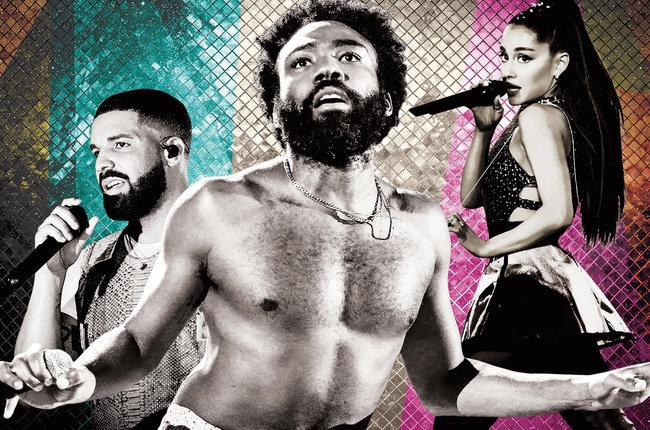"This was the first chink in the armor," says a label executive about the recent Grammy Awards, where a hip-hop track won both record and song of the year for the first time and more women than usual appeared onstage as both honorees and performers a year after Recording Academy president/CEO Neil Portnowfamously suggested they needed to "step up."
It says something about the perception of the awards that at least some in the industry see it as an edifice that's protected -- perhaps, in some cases, from the kind of performers or music they work with. But the consensus among industry executives is that the 61st Grammy Awards represented a significant step in the right direction toward a telecast that reflects a modern music business dominated by hip-hop -- even if there's still a long way to go.
Last year, only one woman -- best new artist winner Alessia Cara -- won a major award that was presented on TV. (Lorde drew attention to the program's gender imbalance by pointing out that she was the only female nominee for album of the year, and the only one not asked to perform a song from that release.) This year, the academy expanded the number of nominees for the four big awards from five to eight, and more women got those spots -- there were five female artists nominated for record of the year, five as performers for song of the year, five as lead artists for album of the year and seven (in six slots) for best new artist. Women won two of those categories -- Kacey Musgraves, for album of the year with Golden Hour, and Dua Lipa, for best new artist.
The ceremony was hosted by Alicia Keys, who set a tone of female empowerment for the evening early on when she brought former first lady Michelle Obama, Lady Gaga, Jada Pinkett Smith and Jennifer Lopez onstage to resounding applause, and women delivered some of the night's standout performances, including Janelle Monáe's sleek "Make Me Feel" and the indefatigable Dolly Parton harmonizing with Miley Cyrus, Katy Perry and Maren Morris, among others.
"This had come to a head," says a female TV producer, talking about how many women were on the show a year after Portnow's comment (for which he apologized). "Women took that remark [about stepping up] literally."
This year's show -- which drew 19.9 million viewers, up from 19.8 million in 2018, according to Nielsen -- reflected today's music business in other ways, too. Childish Gambino's "This Is America" won record and song of the year, and more hip-hop and R&B awards were announced during the main telecast. An academy task force's decision to invite 900 new members in order to diversify the Grammy voting body may have helped.
That's just "a step in the right direction," though, says one high-ranking label executive. Ever since The Fresh Prince and DJ Jazzy Jeff, among others, refused to attend the Grammys in 1989 when the academy decided not to televise the presentation of the first award for best rap performance, the hip-hop community has had a love/hate relationship with the ceremony. More recently, Jay-Z and Kanye West have spoken out against the awards show.
Even this year, Gambino didn't attend to accept his trophy, and both Kendrick Lamar and Drake declined invitations to perform. Drake surprised viewers when he stepped onstage for the first time since 2013 to pick up his best rap song honor -- only to have his acceptance speech cut off. (According to a statement from the show's producers, a "natural pause in his speech" led them to think he was done, and he declined their offer to finish his speech.)
"Thank you [Grammys] for showing more R&B on the show this year," says the first label executive. "But why are you still scared of hip-hop? There still aren't enough people of color in the system, including The Recording Academy and the networks, who understand and respect the genre."
The no-shows weren't limited to hip-hop. Days before the telecast, Ariana Grande (who won best pop vocal album for Sweetener) and longtime Grammys producer Ken Ehrlich got into a back-and-forth in the media after the singer denied Ehrlich's claim that she couldn't perform because it was "too late for her to pull something together."
Questions about the future of the show -- and the academy -- loom large as Portnow prepares to leave this summer after 17 years at the helm. Ehrlich has said that his contract only runs through 2020, which would mark 40 years of producing the venerable show, and that he is unsure if he will return.
Their successors will have the freedom to make changes that many in the industry regard as long overdue, including updating the process to determine both nominees and winners.
"They should absolutely change the voting criteria," says a publishing executive. "If you're working with songwriters and producers, publishing and A&R, you should be able to vote because you're involved with and guiding the creative process." (Voting members are professionals with creative or technical credits on at least six songs, who must then apply for membership and pay annual dues.)
Some label executives believe the academy should make the process more transparent. "Get rid of secret nomination committees and follow the [Academy Awards'] lead and decide nominees by academy votes," says one.
The ultimate fix may come from the evolution of The Recording Academy, although it's hard to predict how fast that will happen. "The old guard has to relinquish its seat at the table," says another industry source. "They've got to let some more new blood in if the Grammys are to survive."
This article originally appeared in the Feb. 16 issue of Billboard.








